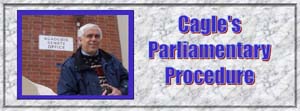
Link to Cagle's Questions page and index.
Link to Cagle's Parliamentary Procedure page.
In general, the articles of incorporation or the bylaws of an organization define the scope of authority of the board of directors and even the relationship of the board to the "stockholders." A board of directors in a university student government would bear a different relationship to the electorate than would the board of directors of a large business with public stock, etc.
In general, a board of directors serves the interests of the stockholders or of the electorate, but in doing so, within the limits of the articles of incorporation or of bylaws, do so in the best judgment of the board members. It would take a bona fide expression of the "will" you speak of to re-direct the board's efforts, and that certainly happens--the stockholders pass motions and directives, the members of a fraternity pass motions at a national convention to direct policy and correct actions of the board they disapprove of, the students pass a referendum to direct the board, etc.
Being incorporated in some sense protects the members of the board from being sued as individuals for legitimate actions of the organization or business, and this protection varies from state to state; legitimate lawsuits may be brought against the organization by parties with some complaint. However, the board members may be sued by the organization for improper actions (e.g., approving and signing a contract at a meeting without a quorum and later a full quorum rejects the contract) or for nonfeasance (failure to do what is expected), or even sued by members of the organization on that basis, or by the parties to the contract affected by the improper actions, etc. Similarly, criminal conduct is not protected.
Ultimately, if members of an organization disapprove of actions of a board of directions, the bylaws usually provide some mechanism for them to legitimately remove them from office.
In short, the board members are responsible to the members of the organization. In an incorporated business, the stockholders are the members, not the employees, by the way. Organizations differ greatly in their composition and nature, of course.
These comments are just a peek at a complex topic in law, but should give you the general direction of an answer to your questions. Again, if you have serious questions on critical matters to your organization, especially if they involve money, it would be a good idea to consult a competent attorney in your state.
Thank you for your reply, the information provided was most informative. I am particularly interested in a Board of Directors of a religious congregation. The Board's authority is fully defined in the Constitution and Bylaws. The primary function is to manage the affairs of the temple-congregation. Could you provide a reference which indicates that board members are responsible to the members of the organization.
The Board in question has taken specific actions to which the congregation has requested in the form of a petition accountability for said actions (70% of the membership signed the petition). Congregants understand the Board has the authority to take said actions but would like an explanation as well as defined directives for future plans regarding said action.. The Constitution indicates a special called meeting must be held within 15 days by the President upon receipt of written request. Congregants have been refused the special called meeting to discuss Board actions and were informed the Board served as a Republic, congregants were to intrust to the Board management decisions.
Petitions are not a legal meeting of the congregation's "assembly," except when expressly provided for in the bylaws. The Special Meeting is the solution to giving the members of the congregation the authority to re-direct the board, if that is their desire. If the President calls the special meeting and no quorum arrives for that meeting, the intent and responsibility of the provision to have the meeting has been discharged. In this case, the President of the board is acting unlawfully if he/she defies the Constitutional provision and could be individually sued, depending on the circumstances.
The degree to which the board has been intrusted to make the management decisions depends on what the bylaws says.
From what you've said, I'd advise you to contact a lawyer to assist the church in resolving these issues. A lawyer can serve as a neutral party to help get the process back on track. A parliamentarian can serve a similar function for you, but if serious legal issues are involved a lawyer is what you need.
The Constitution does not provide any mechanism to remove Board members for any reason. It does allow for amendments. Many thanks for any guidance you can provide.
You need to rewrite your constitution. If the congregation is divided
and polarized on critical issues, sometimes splitting the organization
into two compatible units may be desirable. It's happened before.
Return to Cagle's Questions page and index.
Link to Cagle's Parliamentary Procedure page.